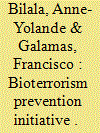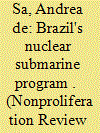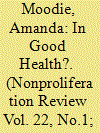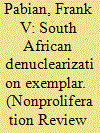|
|
|
Sort Order |
|
|
|
Items / Page
|
|
|
|
|
|
|
| Srl | Item |
| 1 |
ID:
142653


|
|
|
|
|
| Summary/Abstract |
The threat of terrorist use of weapons of mass destruction remains a daunting concern. Governments have undertaken several initiatives at the national and international level to prevent such illicit use, yet challenges remain. Notable is the absence of a single collaborative international forum of experts dedicated solely to bioterrorism prevention. The establishment of a Bioterrorism Prevention Initiative could be a possible solution to address this gap. This article explores possibilities for such an initiative and the ways in which it could strengthen the existing bio-nonproliferation regime.
|
|
|
|
|
|
|
|
|
|
|
|
|
|
|
|
| 2 |
ID:
142649


|
|
|
|
|
| Summary/Abstract |
Narratives about Brazil's nuclear program are distorted by supporters and critics alike. In Brazil, the national nuclear infrastructure is undergoing a period of expansion, with plans to build new nuclear power plants and industrial-scale fuel production facilities. While Brazil's leaders herald the nuclear sector as a triumph for indigenous science and technology, foreigners view the nuclear program as a dangerous legacy of the military regime. This discrepancy becomes even more apparent in discussions about the ongoing construction of Brazil's first nuclear powered submarine. Brazil's military touts the submarine as a symbol of political status, economic growth, and military might. But from abroad, the military's involvement in nuclear development is considered unnecessary, worrisome, and even irresponsible. These narratives—often incomplete or selective—have polarized discussions about Brazil's nuclear submarine program and caused considerable political antagonism during safeguards negotiations. This article works to dispel myths, highlight legitimate concerns, and explain historical perspectives that shed light on some difficulties that can be anticipated in future negotiations.
|
|
|
|
|
|
|
|
|
|
|
|
|
|
|
|
| 3 |
ID:
142652


|
|
|
|
|
| Summary/Abstract |
Since the 1990s, the group of stakeholders working to combat biological weapons (BW) proliferation has broadened to include new actors who have not traditionally focused on security issues, including organizations from the public health sector, researchers in the life sciences, and the biosafety community. This has had significant benefits for the Biological and Toxin Weapons Convention (BWC) and the arms control establishment more broadly. However, the BWC's agenda has become increasingly dominated by issues of international health and global health security. By focusing solely on response strategies, the United States and other interested parties risk losing sight of other important elements of a counter-BW strategy, including deterrence and prevention. Focusing on public health-related issues to the exclusion of more traditional security matters puts the nonproliferation regime at risk, because it limits the amount of time that stakeholders have available to grapple with the critical questions facing the BWC and the biological weapons nonproliferation establishment—questions that must be answered if the regime is to survive.
|
|
|
|
|
|
|
|
|
|
|
|
|
|
|
|
| 4 |
ID:
142650


|
|
|
|
|
| Summary/Abstract |
South Africa's nuclear disarmament is a unique historical case, notable in part for the dramatic shift from deception to cooperation. The unprecedented transparency it demonstrated in order to convince the international community of the veracity of their disarmament is heralded as an exemplar for verifiable denuclearization. Less known is how this case affords insights into how a nuclear weapon program can be clandestinely hidden by the ambiguity provided by an otherwise completely legitimate, peaceful, nuclear energy program. Using a variety of open sources, including newly declassified internal South African and US government reports, it can be shown that South Africa employed a variety of deceptive tactics before it disarmed, and even for nearly two years after becoming a signatory to the Treaty on the Non-Proliferation of Nuclear Weapons. This article reviews that information to derive instructive lessons on the lengths that a nuclear proliferant state might go to conceal its true capabilities and intentions, and to thwart international discovery of the existence and full extent of an existing—or, in this case, a former—nuclear weapon program.
|
|
|
|
|
|
|
|
|
|
|
|
|
|
|
|
| 5 |
ID:
142651


|
|
|
|
|
| Summary/Abstract |
What do we mean by nuclear proliferation? What does it mean to proliferate? This article investigates both the literal and figurative meaning of the term “proliferation.” It argues that many of the definitions and conceptualizations of nuclear proliferation often used by scholars are either limited in their utility or logically inconsistent. It then reconceptualizes and redefines the term, incorporating an understanding of both its etymological origins and the geopolitical context in which the phenomenon occurs. It concludes by exploring the potential impact that the politicization of the phenomenon may have on the identification of occurrences of proliferation, from both an academic and a policy-making perspective.
|
|
|
|
|
|
|
|
|
|
|
|
|
|
|
|
|
|
|
|
|